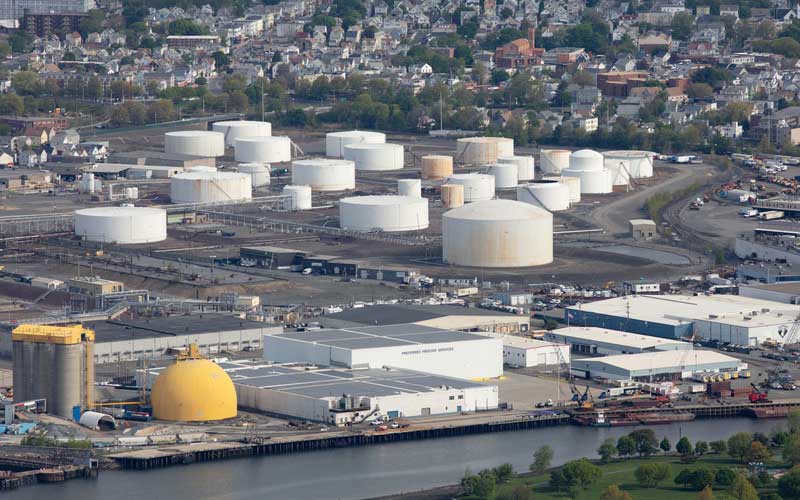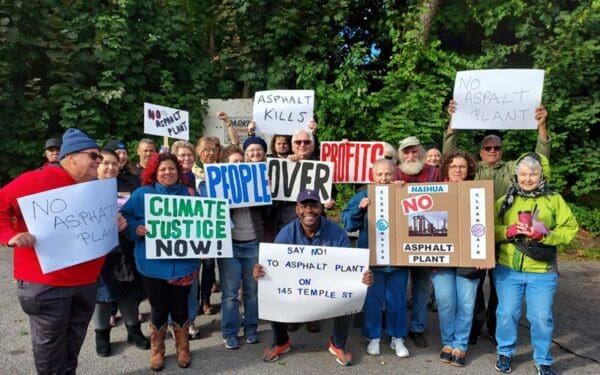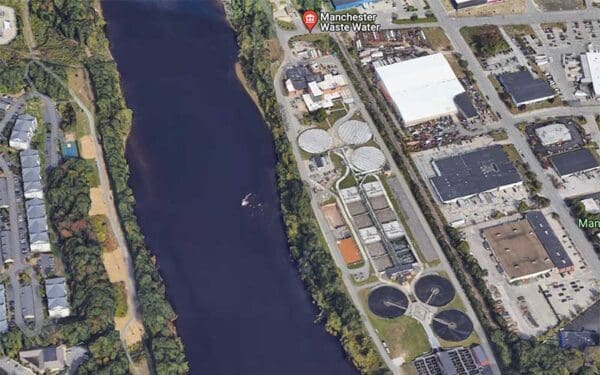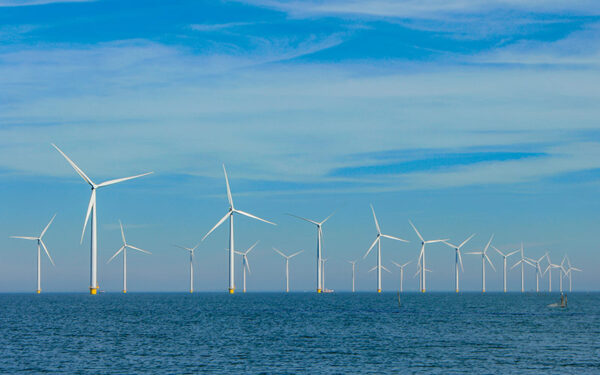
ExxonMobil's oil storage terminal endangered nearby waterways and loomed over residential neighborhoods in Everett. Photo: Alex Maclean
For years, neighbors regarded the massive storage tanks at the ExxonMobil oil terminal in Everett as an eyesore and a hazard. But families long accustomed to the 100-acre tank farm’s fumes and spills into the nearby Mystic River were largely unaware that the danger to their homes and businesses had grown steadily due to climate change. More extreme rains were overwhelming ExxonMobil’s treatment system, flushing more and more toxic carcinogens into the river. Worse yet, ExxonMobil’s refusal even to consider climate risk was putting the community and Boston Harbor one storm away from a catastrophic spill.
But no longer. In a victory for residents in Everett, ExxonMobil, under pressure from a CLF lawsuit, ceased operations and has agreed to sell its aging facility. As part of the agreement, the oil giant has stipulated that the property can never be used to store petroleum products again. That means that residents of Everett will soon be free of unhealthy and overpowering fumes and the risk that a major storm inundating the facility will mean oil and toxic chemicals fouling their streets and basements – as well as the entire Boston Harbor ecosystem – when the next storm hits.
ExxonMobil’s departure is a win for Everett and neighboring Chelsea and part of an expanding CLF effort to hold the oil and gas industry accountable for deceiving the public about its products and facilities, disregarding the law, and putting communities in harm’s way. But we’re only getting started.
Holding Big Oil Accountable
In 2015, exposés by InsideClimate News and the Los Angeles Times confirmed that ExxonMobil, Shell, and other oil giants knew by the late 1970s that climate change caused by human activities would be devastating if left unchecked. ExxonMobil’s scientists predicted, with startling accuracy, the more extreme weather we are seeing in New England today and – within the company – recognized that their facilities would be at risk. They also knew their company’s products were the primary cause of the emerging climate crisis. Even so, ExxonMobil joined with other major oil companies in spending hundreds of millions of dollars to deceive the public about their products, undermine climate science, and derail even modest efforts to curb emissions burning fossil fuels.
CLF started our own investigation, focused on how this climate deceit affected oil companies’ compliance with the law and their operation of climate-vulnerable facilities here in New England. We found that, despite deep knowledge of climate risk and layered obligations under federal law to minimize oil spill risks at their facilities, ExxonMobil had done nothing to adapt its Everett terminal to the new normal of extreme weather. Significant discharges of potent carcinogens – self-reported violations of their EPA permit – were growing more frequent as their system for treating polluted stormwater became overwhelmed. Yet ExxonMobil had taken no action to safeguard the facility against imminent threats of inundation from more intense storms and rising seas.
To avert catastrophe for the community, the Mystic River, and Boston Harbor, CLF acted to hold Exxon accountable for its climate deceit and numerous violations of the Clean Water Act linked to that deceit. CLF filed suit against the corporate giant in 2016 and prevailed against multiple ExxonMobil motions to dismiss or stay the case. Ours was the first climate case against a major oil company to reach discovery – the formal process when the parties to a lawsuit exchange information about evidence and witnesses to be presented at trial.
Exxon Victory Marks Progress, But We Remain on the Case
Everett and Boston Harbor are now safer, but similar climate-vulnerable facilities dot the New England coast from New Haven, Connecticut, to Portland, Maine. In Providence, Rhode Island, we have sued Shell Oil for its unlawful operation of a low-lying, climate-vulnerable storage terminal, which puts the Port of Providence and the shores of Narragansett Bay at risk. And in Connecticut, we’ve sued Shell and Gulf for at-risk terminals that endanger downtown New Haven neighborhoods and Long Island Sound. Their tank farms sit near homes, schools, community centers, and the Mill River, where recreational fishers routinely dangle their lines.
These cases have been a David vs. Goliath battle in every sense of the term. The residents impacted by these facilities’ pollution are already at a disadvantage: lower-income, immigrant, and communities of color that have been overburdened by pollution and historically underserved by agencies charged with enforcing the law. And our oil company defendants are taking a scorched-earth approach to the litigation, throwing dozens of lawyers at these cases, knowing that accountability for their climate deceit ultimately imperils their operations nationally and internationally.
Communities Are Rising Up
As we celebrate this win against those most responsible for climate change, we feel heartened knowing that we are propelling a small but growing movement to hold Big Oil accountable on climate. Since 2017, five states, the District of Columbia, and 20 municipalities have taken major climate polluters to court. The deceit of these fossil fuel giants has ushered in an age of rapid climate change that is causing more pollution, illness, and death while saddling cities and towns with the ever-increasing costs of responding to extreme weather – all while sowing doubt about climate science and blocking national policy solutions.
At CLF, we’re proud that with your help, we have been able to challenge a fossil fuel industry unwilling to accept responsibility for its role in the climate crisis. Exxon worked for seven years to block our progress in court. But just as we refused to back down in Everett, we will continue to go head-to-head with Shell, Gulf, and other fossil fuel companies who would pollute our air and water, harm our communities, and damage our climate. In Connecticut, a U.S. District Court judge recently denied Shell’s attempt to dismiss our case. And in Rhode Island, we are fighting in court to force Shell to answer basic questions about its Providence terminal and its readiness for extreme weather.
Big Oil can continue to resist and deny, but both the scale of their legal peril and the staggering price tag of their climate deceit are becoming more apparent day by day. While Exxon retreats from Everett, we’re staying put and on task. We will remain on the case to ensure Exxon’s agreement to protect the property is fully honored. And, we will keep pressing forward until all New England communities living in the shadow of similar lawbreaking facilities are protected.




